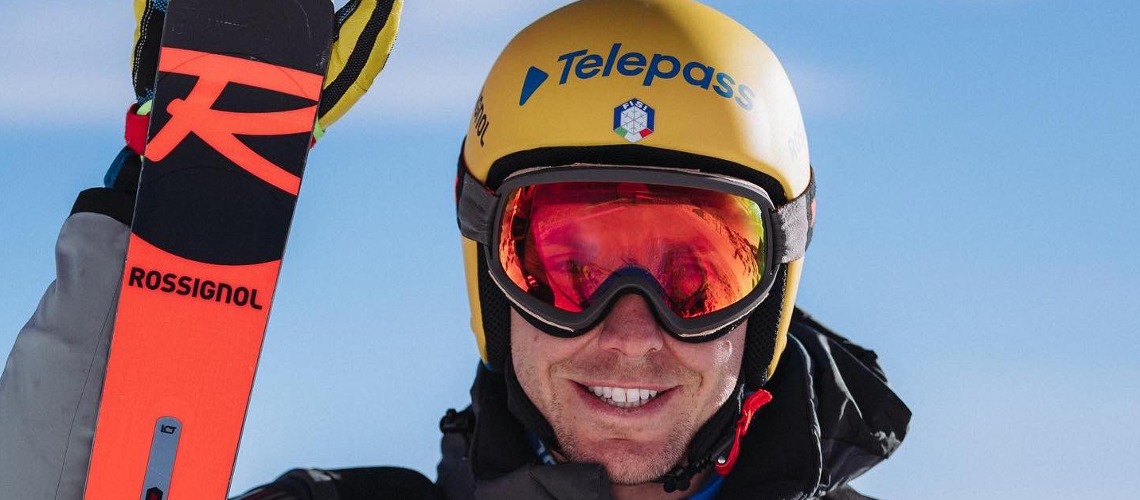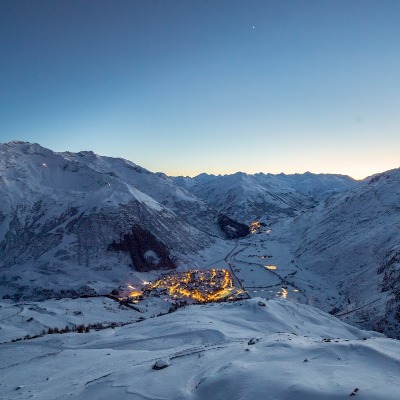Casse Beats Odermatt To Grab First World Cup Win In Val Gradena Super G

34-year-old Mattia Casse (ITA/ Rossignol) recorded the first Audi FIS World Cup victory of his career on Friday, prevailing in an extraordinary race that also saw 33-year-old Jared Goldberg (USA/ Rossignol) make his first World Cup career podium. Both racers beat defending Super G champion Marco Odermatt (SUI/ Stöckli), who came third, at Val Gardena.
It was a snowy start to the day, with upwards of 15 centimeters of new snow on the track. Despite the new snow, the dedicated course workers worked tirelessly overnight to clear the track, making way for the best super-G skiers in the world. Yet, when race day presented itself, it was not the snow that was a factor but the wind. Wind became a factor throughout the day when it was not snowing, causing variable conditions for many racers.
Piedmont-raised Casse roared “vamos” as he crossed the line to take the lead, skiing bib ten, fully knowing that he had put in the performance of a lifetime.
Odermatt came down shortly after, but after a poor landing on the first jump, was always playing catch-up, and couldn’t reel in the Italian, finishing +0.43 behind.
As the bibs moved into the 20s and snow began to fall, Casse must have thought he was safe, but Goldberg – 26th out the gate – delivered a run of aggression and control that saw him just +0.01 away from top slot.
Casse has been skiing on the circuit since December 2009, mainly finishing well down the standings – and often outside the top 100. 2020 was a breakthrough term, as he got into the top 30 (26th overall), but it was the last two seasons that Casse made real strides.
In December 2022 and January 2023 he notched his first three career podiums – third in the Downhill at Val Gardena, third in the Downhill at Wengen, and third in the Super G at Cortina. Now, at the site of his first podium, he moved up to the top step.
Casse looked in control where others stuttered – Cyprien Sarrazin (FRA/ Rossignol) skied out after missing a gate, Vincent Kriechmayr (AUT/ Head) struggled mid course, and Odermatt mis-timed his jump. The conditions – cloudy and with light snow, after a major snowfall the day before, played into his hands, according to the delighted winner.
“The slope was good, 20cm of fresh snow yesterday, but the condition was windy and snowy,” he said. “I like this snow. Today I pushed hard. I skied well also in Beaver Creek but made a lot of mistakes. Today was a good run, tomorrow I hope to try a good race [again].”
Considering the struggles of many other skiers on the day as conditions fluctuated, Odermatt – who prefers a more technical course – was content with his run to third. On a tough mid section, he made several characteristic recoveries as he pushed hard to make up lost time.
“I felt pretty OK,” he said. “I am very happy. For me as a GS guy, there are no real turns, no real steep parts, so it is challenging for me to find good speed and not lose it. The top and last section was very good. In the middle I lost a bit of time. I don’t really know why, until now, but I will analyse it. The slope looked not that good, not that compact, but the feeling on the skis was way better than expected. They did a good job. You never know how the slope is going to react to fresh snow. In Val Gardena, you never celebrate until the last guys are in the finish.”
He was spot on with this assessment: one more twist was still to come. Goldberg, like Casse, has spent a career finishing in the lower orders of the FIS rankings. In his first ten seasons, his best overall finish was 63rd (in 2018) his key achievement was time as a top-20 ranked Combined racer. Like Casse, though, he has stepped up recently: he was ranked 10th in Super G last term, and 11th in Downhill: combining savvy and power, a further breakthough was possible. In Val Gardena, it arrived, thanks to conditions perfectly suited to the American.
The first U.S. Ski Team athlete to go was Olympic silver medalist Ryan Cochran-Siegle (RCS). Cochran-Siegle set the pace for what seemed to be a solid run. However, about five racers in the speed started to show and many racers came in with the new fastest time.
Approximately 25 racers, a brief course hold and some snow later, it was time for Goldberg. Goldberg came out of the start on fire. Each split in the green. The crowd was on their feet as the Americans could once again upset the field in Val Gardena, which they've done for years past--it's no secret that the American men have found great success on this track.
Back to the races, Goldberg flew down to cross the line a mere 0.01 hundredth from the win. Despite not claiming the official win, Goldberg, his teammates and the stands cheered as if it were gold. Notably, it was his first podium and career-best result.
“I’m fired up,” he said afterwards. “I skied how I wanted to. Everything felt so good. I felt like I was going fast. I was a little worried, there was a hold around bib 18 and I wasn’t sure if the track would slow down. I had that in my head. We had snow, the early guys didn’t. I pushed hard, and was able to block that out. I wasn’t thinking about overdoing it. I was definitely going fast down the bottom, holding a tuck where I could, that helped.”
The course was tailor made for his style, he believes. “There’s a lot of steep-to-flats, it’s like a freeski mountain,” he added.
“I grew up skiing at Snowbird in Utah and I freeskied a lot. I feel like I’m always trying to carry speed. It feels natural to barely make a couple of gates, then really juice the steep-to-flat. It feels more natural than Beaver Creek, where you have to ski for a long time. I made a couple of powder turns on the downhill in the morning, so maybe that helped, too.”
24-year-old Fredrik Moeller (NOR/ Atomic), meanwhile, also put in an impressive, coming fourth on a course set by his coach, +0.54 adrift of Casse.













